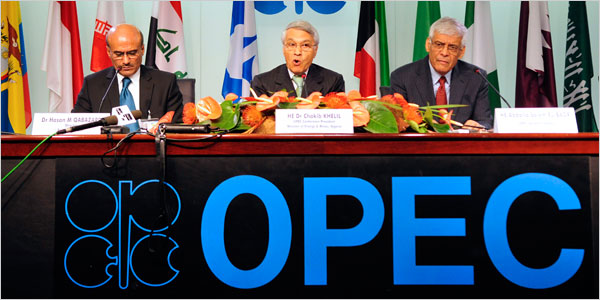OPEC’s Vienna meeting: the views so far

VIENNA–With less than 24 hours to go until the Organization of the Petroleum Exporting Countries meets to discuss whether to take action to stabilize the steep slide in oil prices, market watchers are still guessing what the group will actually do.
Here’s a round-up of what the ministers have said so far this week in the run-up to Thursday’s meeting:
Angola: Though he stopped short of calling directly for an output cut when he arrived in Vienna Wednesday, Angola’s oil minister Jose Maria Botelho de Vasconcelos strongly suggested he would support one, saying there was a surplus of oil in the market and calling for prices to return to $100 a barrel. “We will analyze the situation and I think we will achieve consensus” to change the market situation, he said of his expectations for Thursday’s meeting, comparing the current situation to 2008 when OPEC drastically slashed output to support prices.
Iran: OPEC should comply with its agreed production ceiling of 30 million barrels a day, Iran’s oil minister Bijan Zanganeh said on arriving in Vienna Wednesday. Doing that would imply a cut of around 300,000 barrels a day from the group’s October production level, but Mr. Zanganeh made it clear Iran has no intention contributing to any cut and in fact hopes to boost output that has been heavily restricted by western sanctions. ”We don’t need to receive any permission from outside Iran to increase production,” he said.
Iraq: One of the first oil ministers to arrive in Vienna this week, Iraq’s Adel Abdul-Mehdi kicked things off with a clear message: oil prices are not acceptable and something needs to be done. He did not say whether or not Iraq–still struggling to bring its oil production back above its pre-Saddam level and contending with an Islamist insurgency in its north– would participate in such action.
Saudi Arabia: Representatives of the OPEC kingpin have maintained a sphinx-like silence this week, finally broken Wednesday when oil minister Ali al-Naimi said that the market “will stabilize itself.” The minister has attended closed-door meetings with OPEC and non-OPEC members this week but has given no indication the Kingdom might consider a cut.
Venezuela: Venezuela’s foreign minister Rafael Ramirez has been doing the rounds, sharing his views on the market with a roster of high-profile officials this week. Speaking after a meeting with senior energy officials from Saudi Arabia, Mexico and Russia Tuesday, Mr. Ramirez said he wanted oil prices to go back to $100 a barrel, despite seeming to have failed to secure any agreement of action. ”Everybody has their own vision of the market, but everybody agreed that the price level is not good…everybody is worried about the price,” he said.
By SARAH KENT, SUMMER SAID and BENOIT FAUCON
Source: WSJ

